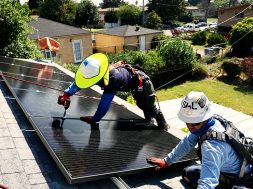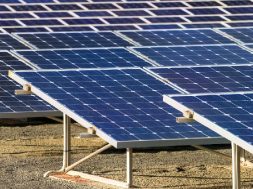
Three Dutch ‘energy entrepreneurs’ help villages harness solar power
Three Dutch “energy entrepreneurs” have created 100 women entrepreneurs in about 50 villages across Bankey Bazaar in Gaya, Bihar, thereby powering 1,500 households. Founded in 2011, the start-up built clean and sustainable energy solutions for India’s poor to allow villagers to generate and share energy in a simple yet effective way through “smart grids for rural India” and light up powerless villages of the country. What began as a two-month stint in “powerless” Mohgaon village of Madhya Pradesh in 2013, saw childhood friends Evan Mertens, Harmen van Heist and Marcel van Heist develop the prototype of a “small energy kit” that allows users to generate energy and also become local energy supplier by selling surplus energy to fellow villagers and thus earning money.
Speaking at NID-Ahmedabad’s design symposium, “Design Driven Entrepreneurship” on Monday, Evan Mertens, one of the founders of “Rural Spark”, said, “We zeroed in on working in India as the energy growth was not concurrent with its economic growth and many places here don’t have access to electricity. We believe that the future is where an ‘internet of Energy’ will be in practice. Through a kit containing solar panels, 12 chargeable solar led lamps, a battery pack, 2 small bulbs that cost up to Rs 20,000 — a fan, television, security lamps can be run and phones can be charged in such ‘powerless’ villages.”
Speaking to the paper, Mertens said, “Part of self-help groups (SHGs) in villages, these women entrepreneurs have found interesting ‘business models’ like rent out rooms for people to use for their electricity needs, provide mobile charging for anywhere between Rs 2 and Rs 25. Few are shopowners who can keep their shops open for longer in the absence of electricity and a few are making money by renting out on lamps. An energy entrepreneur can buy 60 lamps and rent it out and earn Rs 5,000 a month. The perks of doing this include safe lighting and people save close to Rs 200-250 on buying kerosene a month and just shell out just Rs 90 now and also gain social benefits like ‘increased status’ in the village. We sell products through distribution partners and by a prepaid model wherein entrepreneurs pay Rs 2,000 as monthly fee and rent out appliances like the lamps or the electricity to villagers. This technology was needed because the villagers did not have electricity or the quality of network in their village was not efficient.”
As the firm rolled out their first complete manufactured kit and sold five kits last month, it is now looking at partnerships with state governments, NGOs, micro-finance institutions and raise funds of close to $3 million. Looking to most of the north Indian states like Bihar, Jharkhand, Uttar Pradesh and North-East states and African nations as future markets, Mertens said that the early discussions on scaling this model was on with Self Employed Women’s Association (SEWA) here for a “pilot run” in Bihar. It is also in talks with the Nagaland government.
Source:indianexpress











